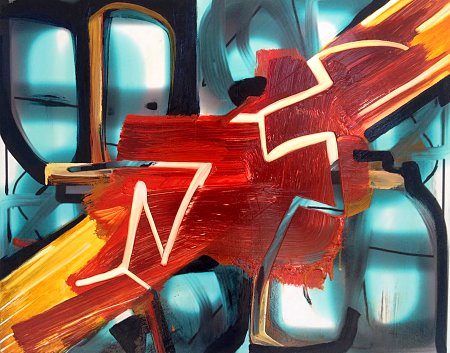
Bread and Peppermint Oil
Someone once told Ray that doctors’ waiting rooms were cold on purpose—cold temperatures discouraged germs, or something like that. “You need to sign as a parent or guardian,” said the receptionist. She was a dark woman—Hispanic—with pale lipstick (“nude,” he supposed) that gave her a bloodless look around the mouth, as though she had spent a few hours with her lips sucked into a bottle. The bubblegum bouncing between her teeth was a brilliant Pepto-Bismol pink. She handed Adams a blue clipboard. But if cold temperatures discouraged the spread of diseases, Ray wondered, why were colds so prevalent in the wintertime? Didn’t being out in the cold make you sick?
Adams gestured toward the chairs in the corner with the clipboard, and Ray shuffled across the carpet, holding his hands very still. He sat down slowly, lowering his chains into the muffling cleft between his knees. Despite the interior chill, every corner of his body was still moist with sweat from the Kentucky summer heat outside. Out of the corner of his eye, he saw a frosted soccer mom hiss at her son to stop staring at him. Two years ago, Ray had been in the habit of playing out vicious fantasies—preparing himself to snarl at the gawkers, brazen it out—but he could never bring the demon to the surface, and after a long time of suppression the urge seemed to die away.
Adams came back to the seating area and stood tapping his wallet against his palm. “Well,” he said, “I’ve made a blunder.” Ray waited, a little apprehensive. “Turns out, your appointment’s not ’til one-thirty.” He looked at his watch. “Eleven-forty now,” he went on; “that’s quite a while to wait. And by time you get out . . . .” Ray could see wheels turning in Adams’ head. “I reckon we might as well have something to eat.”
There was a loose-lipped, lazy-eyed young albino woman slinging one full hip against the newspaper machine outside the restaurant. Funny, thought Ray, you could tell she was black just by her expression, just by her stance—a series of almost arrogantly slung curves, each supported by the tension of the curve beneath—both calves hyperextended; one hip dropped; lower back pressed into the stomach, while shoulders reclined in midair; chin tilted high and eyelids almost closed in a sort of Egyptian hauteur, an impenetrable regality. That was how young black women stood, even this one the color of old piano keys, brief blonde fuzz of hair clinging to her skull in a few sparse, scrawny braids. As Ray passed into the door that Adams held for him, he couldn’t help but look for the slits, the slivers of pale pink-brown under brittle straw-yellow lashes—and their eyes met. The door swung shut behind Ray, and through the glass he saw the albino girl reaccept her weight from the newspaper machine and saunter away across the parking lot.
The hostess seated them almost immediately. Ray followed Adams into the back corner of the restaurant, keeping his eyes on the toes of his shoes and the grapevined purple-green carpet flowing past. Waves of hot stares passed over him like seams in a stretch of pavement. He raised his head when they reached the table, eased himself into the seat facing the wall so that the restaurant was at his back. There were broken crayon pieces shoved up under the napkin dispenser. Ray fished one out with his fork and fingered it as the waitress rattled off the special and the soft drinks and the sides. She left them with the assurance of her swift return and a basket of golden, steaming rolls. Adams reached for them.
“Best thing about this place,” he said, pulling one open with his thumbs and releasing a plume of steam. “You ever been to O’Charley’s?”
